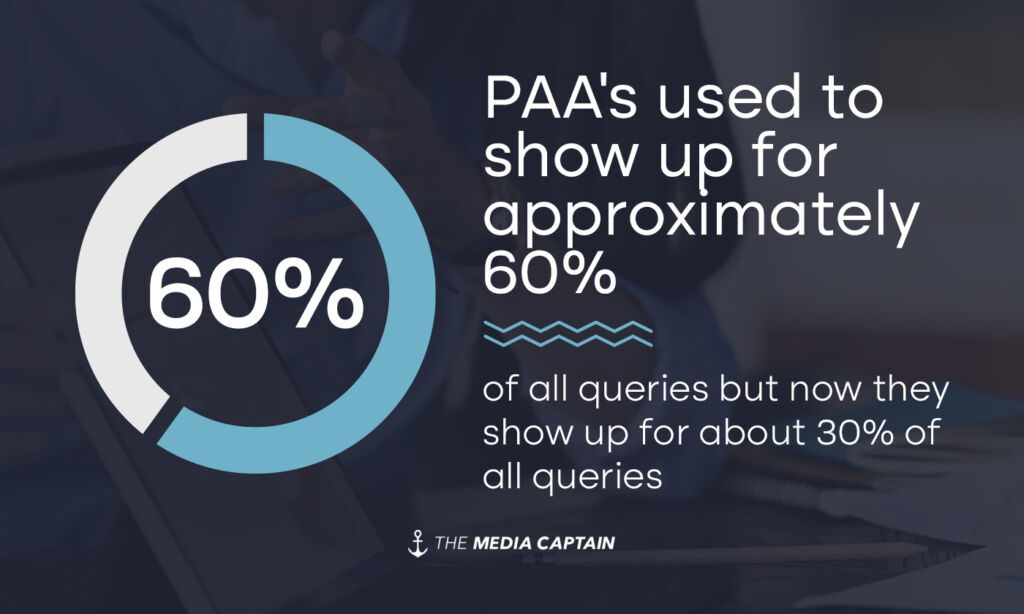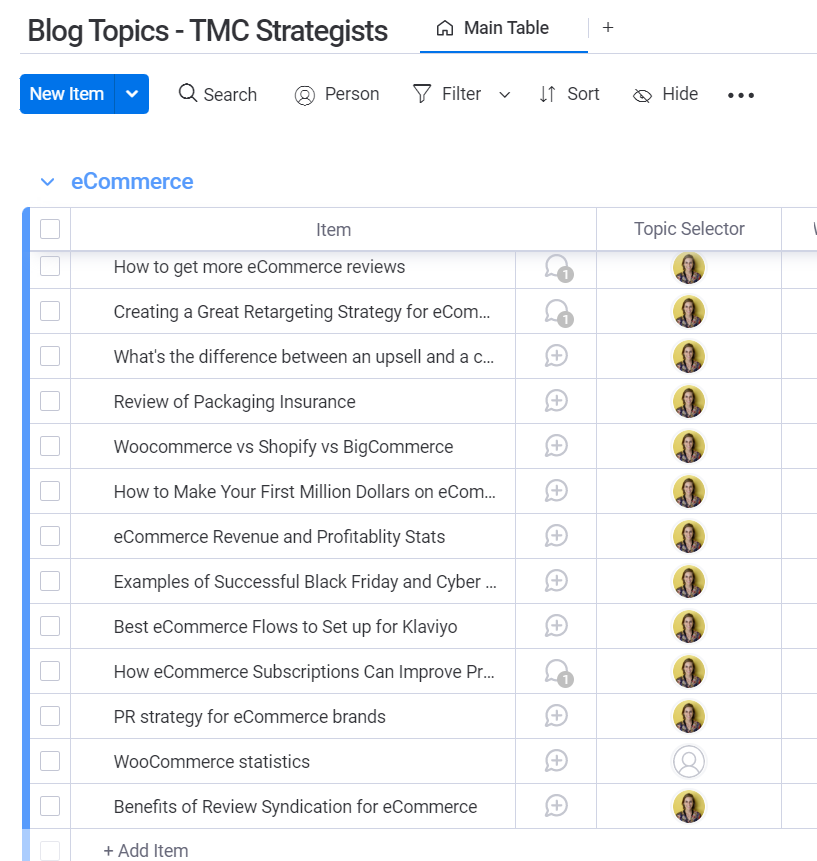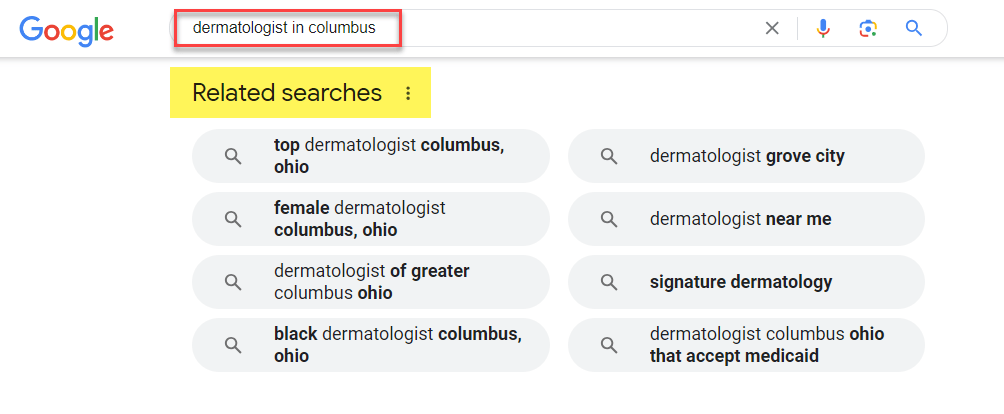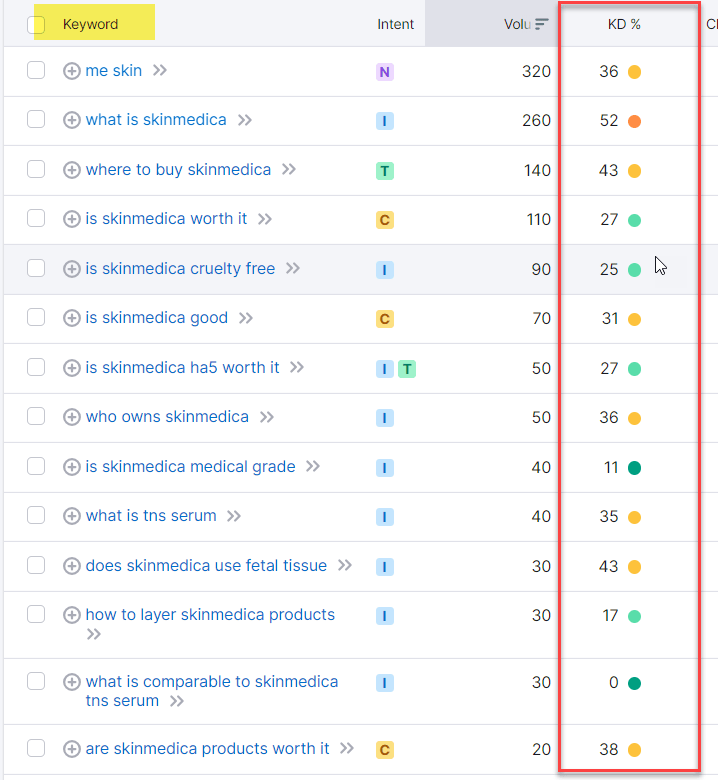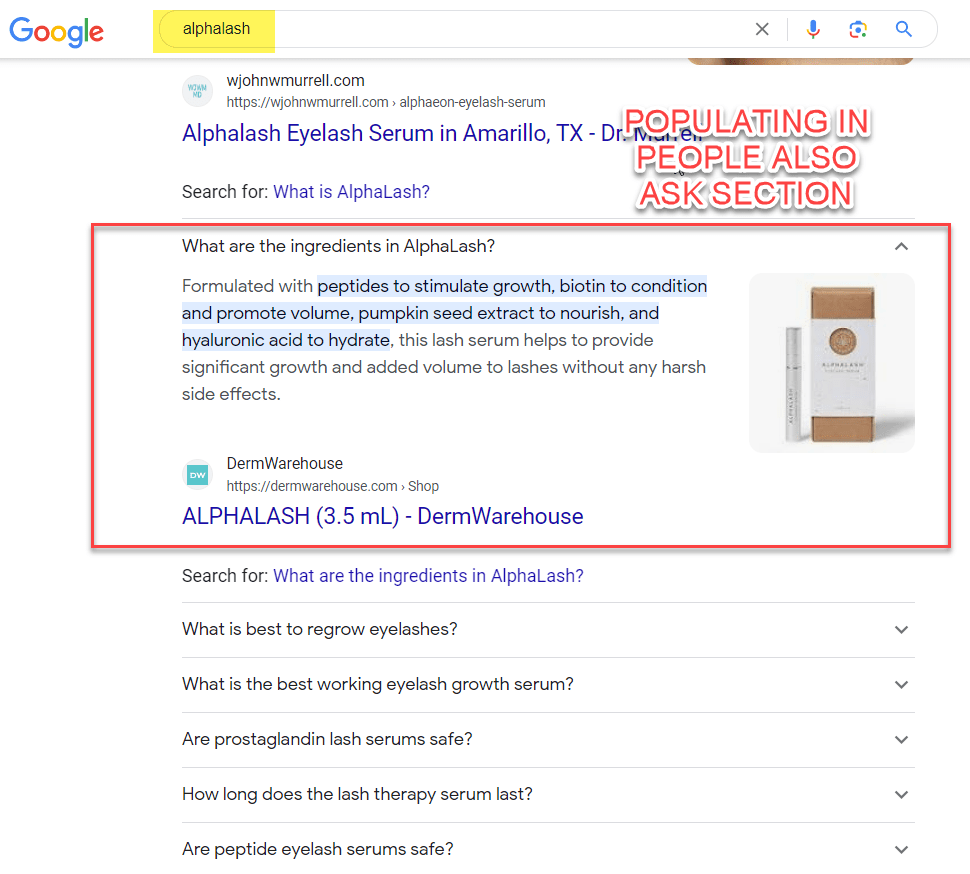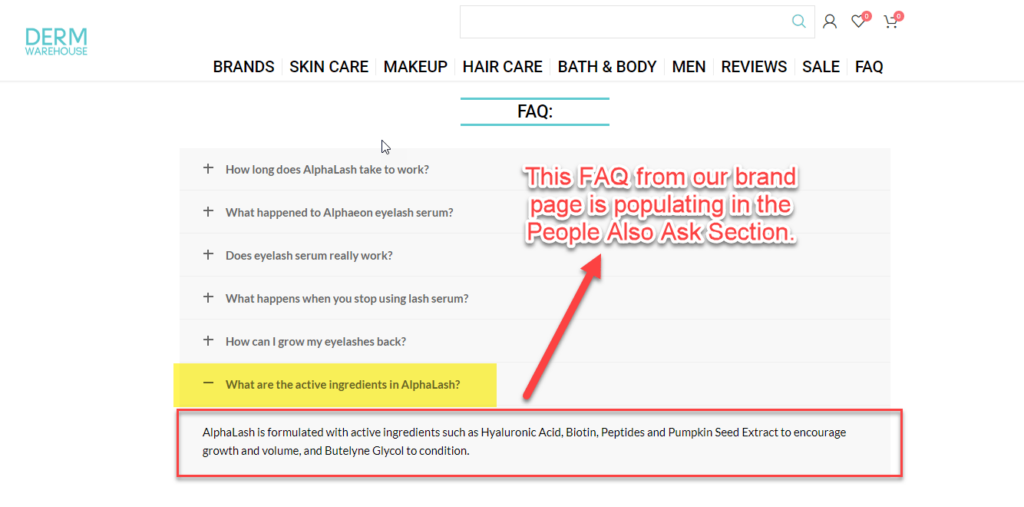When you conduct a Google Search, many people skip over the Google Ads and go directly to the organic results. The majority of people trust organic search results more than paid advertisements.
Once you hit the organic search results, you’ll notice a “People Also Ask” (PAA) section. This is prime real estate on the first page of Google that your business can rank organically for.
How do you rank your content in the “People Also Ask” section? You must find popular questions people are asking about your product, service, or niche and answer those questions on your website. The PAAs often come from blog posts, FAQs, YouTube videos, or other informational-type queries. The great part about the People Also Ask section is it allows smaller businesses to populate on the first page of Google for less competitive queries.
Let’s learn more about PAAs and how to get your website ranking in this coveted section!
Example of People Also Ask on Google
Below is an example of a search query for ClarityRX, a skincare brand. You’ll notice that the first organic result is for the brand itself. It’s going to be hard for anyone to outrank the brand. Right below the first organic result is the People Also Ask section. Google compiles popular questions based on the search query into this accordion-style format.
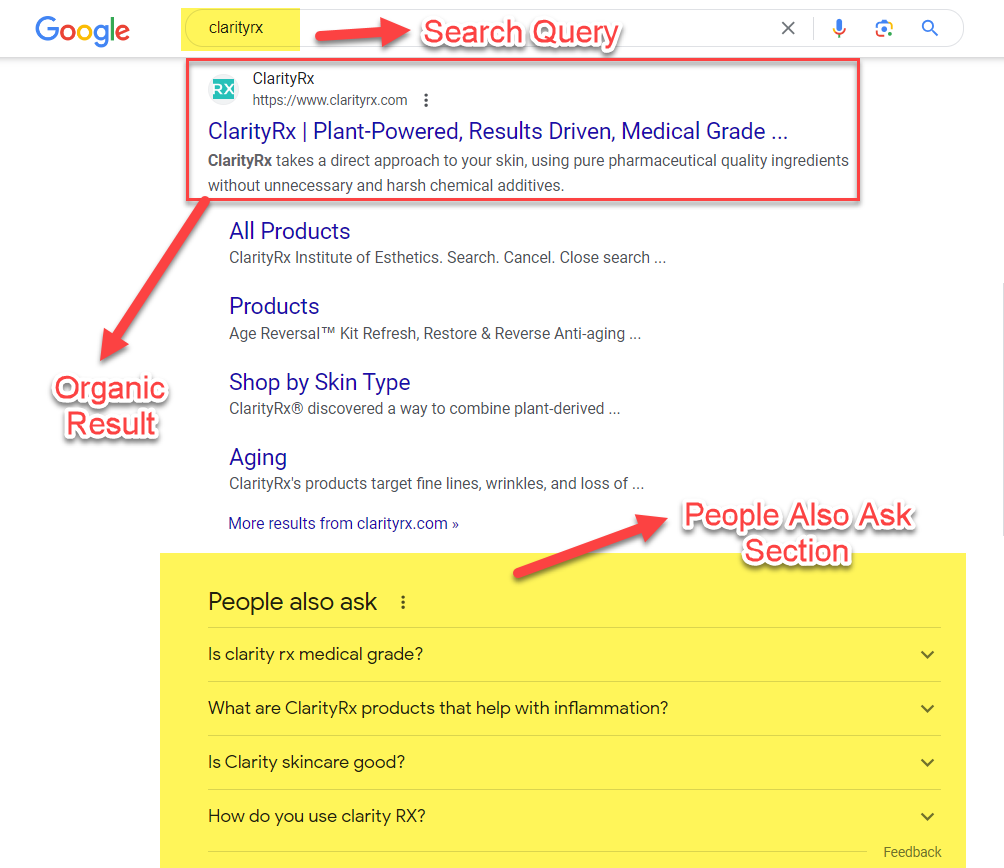
Better Understanding PAA’s
- People Also Ask is a Google-rich snippet feature that provides users with additional information they may be looking for from their initial query [source].
- The PAA section appears on the first page of Google in prominent placement towards the top of page one.
- The majority of results that appear in PAAs are information queries, meaning there is a question being answered on a website that’s getting pulled into the PAA.
- Blogs, YouTube videos, and FAQs are some of the most common forms of content that pull into the PAA
- When you click on one of the PAAs, the questions will be expanded to show more results.
- PAA results used to appear quite frequently. This has cooled off a bit. According to Search Engine Land, PAAs used to show up for approximately 60% of all queries, but now they show up for about 30% of all queries.
- The PAA section is coveted real estate that your website can rank for if you answer key questions in strategic places throughout your site (more on this to come).
Initial Research: Finding What to Write About In People Also Ask Section
How exactly do you get your business to appear in the coveted People Also Ask section? It all starts with the proper keyword and question-based research. The PAA is all about answering questions! There’s no better place to get a list of questions than your customers and prospects.
Jotting Down Customer Questions
- When you are speaking with current and prospective clients/customers, jot down questions. This is one of the best ways to create unique content for the PAA section.
- Queries that appear in the PAA section don’t have a lot of search volume, so uniqueness is a differentiator, hence why client questions are such a great way to find unique topics to write about.
- If you go to the PAA section and try to replicate something already written, this would not be unique, and you’ll be climbing an uphill battle.
- Your company should create a process to take note of daily questions so you can determine which ones would be best for your website.
- The beauty about jotting down questions and adding this information to your site is that you can appear in the PAA but also will serve as a sales resource when your customers/prospects have the same question.
Staying Organized With Customer Questions
- Our agency and eCom brands are set up on Monday.com, a fantastic project management software.
- Our entire team is trained to write down questions from customers and prospects within a Monday.com board, which keeps this process organized.
- The questions that come in from prospective customers will differ from those from current customers since they have different intent.
- Our team determines which questions will make for good website blog posts. We also look to see which questions can be added to existing service or product pages.
- Well-written, informative content is likely to rank well on Google.
Below is a visual from our Monday.com board for The Media Captain of blog topics we intend to write about, all based on customer feedback and prospective client insight:
Conducting Keyword Research
- If you have a stronger website authority or write better content than what’s populating in the PAAs, your content can still appear in the People Also Ask section.
- A Google search is a great way to find popular questions people seek.
- We recommend looking at the related searches at the bottom of Google along with questions beneath your search query for topic ideation.
- You can also use third-party tools like SEMRush to find a list of questions.
- The issue with keyword research tools is that the best queries for PAAs are often long-tailed, niche keywords with limited keyword volume. This is why we love jotting down customer questions; it’s more unique.
- Below was a search for “Columbus Dermatologist.”
- Scrolling to the bottom of the first page, you will find “Related Searches.”
- There are valuable queries that provide you with insight into what people seek.
- If you had a female dermatologist at your practice or accepted Medicaid, this would be great content to add to your site, which could help you better popular organically and in the PAA.
Questions Beneath Search Queries
- When you conduct a Google Search, other popular questions and queries auto-fill underneath your search query.
- These questions are great resources for what keywords and topics to write about on your website, which can appear in the PAA.
Paid Tool: SEMRush
- SEMRush’s Keyword Magic Tool has a database of over 25 billion keywords.
- There is a “Questions” section where it will find relevant questions to a specific keyword.
- There is a metric called “KD,” which is keyword difficulty, an indicator of how hard it will be to rank for a specific query.
- Finding low-difficulty keywords is a great opportunity to rank within the People Also Ask section.
Optimizing Website for People Also Ask
- Most queries that rank in the People Also Ask Section are blog posts or FAQs.
- Informational type of content more commonly appears in the People Also Ask Section versus commercial.
- YouTube videos have been gaining more relevance and exposure within the PAAs
- When you have strong headlines on blogs, this also increases your chances of appearing in the PAA section. Google loves strong headlines and will pull a section from a blog into the FAQ.
FAQ Example
- Below is a Google search for Alphalash.
- Our in-house eCom brand, DermWarehouse, populates in the PAA for “What are the Ingredients of Alphalash?”
- We knew “Active Ingredients for Alphalash” was a popular question, so we included this on our brand page FAQ.
- This strategic effort helped us gain first-page positioning via the People Also Ask section, leading to more organic traffic for a profitable product page on our site.
Populating in the PAA
Ingredient Information Pulling From FAQ On Brand Page
- You will see that we have information listed as a FAQ on the Alphaeon brand page.
- Google loves FAQs and frequently pulls them into the PAA
- You can use FAQ schema to better inform Google where FAQ content lives on your site
In Closing
- The People Also Ask area on Google has prime real estate for page one search results.
- You don’t have to be a powerful website to rank well in the People Also Ask section.
- Take notes of questions from your current and prospective customers, as this makes for great content for your website, which can rank well in the PAA section.
- Researching topics on Google and leveraging keyword research tools can help you find great information to write about.
- Be strategic in finding the best place on your site for answering questions. For The Media Captain, it’s blogs. For DermWarehouse, it’s product and brand pages. Find your sweet spot.
- Schematic markup is available for Q&A sections; this isn’t a requirement but isn’t tough to implement.
If you have any questions on Google’s “People Also Ask” section or anything about SEO, contact our experts at The Media Captain!



